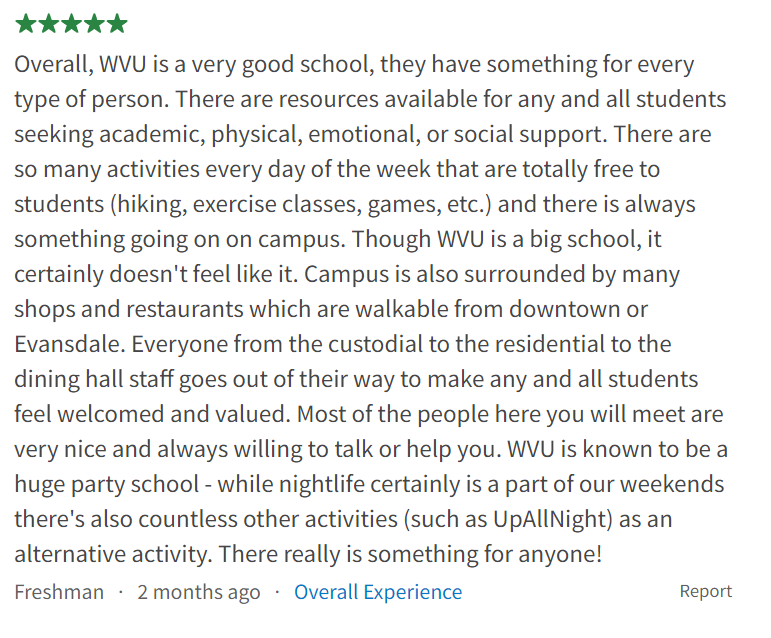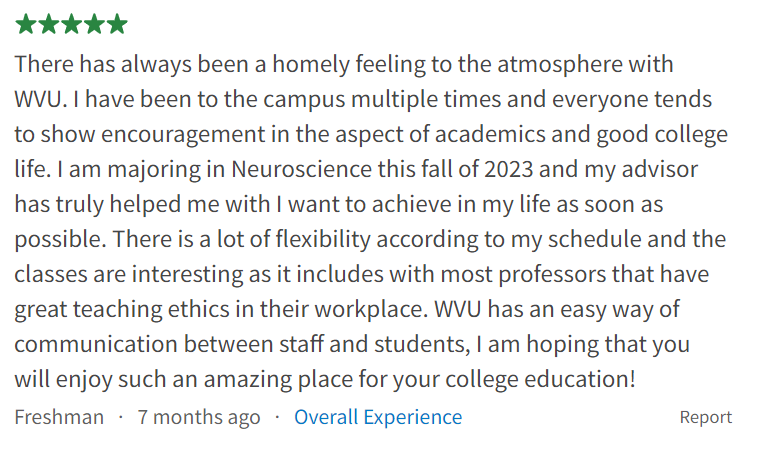All You Need To Know About WVU Nursing (West Virginia University) In 2024
Nursing is a noble profession that offers immense satisfaction and rewards. If you're considering a career in nursing, West Virginia University (WVU) School of Nursing is an excellent choice to launch your journey. Here's a comprehensive overview of the program and what you can expect in 2024.
WVU Nursing and its history
West Virginia University (WVU) is a public land-grant research university with its main campus in Morgantown, West Virginia. It is the state's flagship university and one of the most selective public universities in the United States.
WVU was founded in 1867 and is home to over 30,000 students from all 50 states and over 100 countries.
West Virginia University (WVU) is accredited by the Southern Association of Colleges and Schools Commission on Colleges (SACSCOC) to award baccalaureate, master's, doctoral, and professional degrees.
WVU, founded in 1867 as the Agricultural College of West Virginia, expanded its focus to include engineering, law, and medicine. In 1891, it was renamed West Virginia University, reflecting its broader academic offerings.
Today, WVU is a comprehensive public research university offering undergraduate and graduate programs in engineering, medicine, law, business, and education. The university is home to several nationally ranked research centers, including the WVU Rockefeller Neuroscience Institute, the WVU Center for Health Enhancement and Wellness, and the WVU Institute for Biomedical Research.
WVU has played a significant role in West Virginia's development, providing world-class education and contributing to the state's economy through research and development activities.
Researching nursing schools
When choosing a nursing education, consider factors such as local community colleges, their graduates' pass rate on the NCLEX exam, and their ability to prepare for the exam. A good college should have an acceptable passing rate of at least 80%. Consider factors like lifestyle, family needs, career goals, and financial status when choosing a college. Ask yourself basic questions to ensure a well-rounded education.
1- Campus and location
Consider the campus environment, location, and proximity to your home or desired work location. You want to feel comfortable and supported in your learning environment.
2- Accreditation
When choosing a nursing school, consider accreditation, which is a nationally recognized organization that sets academic standards for nurses. Healthcare facilities often prefer hiring nurses from accredited schools due to the trust in their training.
The two main accrediting organizations for nurses are the Commission on Collegiate Nursing Education (CCNE) and the Accreditation Commission for Education in Nursing (ACEN). Ensure all nursing schools are recognized by these organizations.
3- Online vs. in-person
Online classes can be flexible and accommodating for work schedules, but they require self-discipline. If you struggle with focus or procrastinate, in-person classes may be a better fit.
Some nursing schools offer hybrid programs that combine online courses with hands-on instruction, allowing students to make their own schedules and graduate with confidence in their clinical skills and decision-making.
However, it's important to be honest about your learning preferences and find a balance between online and in-person classes.
4- NCLEX first-time pass rates
The NCLEX exam is a prerequisite for new nurses to become licensed and treat patients. A school's NCLEX pass rate indicates their readiness for graduates. Some schools offer services like free review courses and tutoring to help students pass the exam.
Choosing a school that goes the extra mile to help students achieve licensure can alleviate the pressure of achieving licensure. Overall, a well-prepared nursing school can significantly impact graduates' chances of obtaining their first nursing job.
5- Available programs
Accredited nursing programs cover anatomy, pharmacology, healthcare ethics, and patient-care techniques. Choosing the right nursing degree is crucial for long-term career growth. Some programs offer associate degrees in nursing (ADNs), which take two years but may limit career growth without extensive training.
A Bachelor of Science in Nursing (BSN) degree, which takes longer but offers broader career options, more nursing specialties, and higher average salaries, is recommended.
6- Job placement rates
Check the school's job placement rates for graduates. This can give you an idea of how well the school prepares its students for the nursing workforce.
WVU Nursing admissions requirements
First-time freshmen admission requirements:
First-time freshman applicants at Morgantown University must successfully complete four high school courses: English, three college preparatory mathematics, four units of Social Studies/Fine Arts, three units of Science, and two units of the same World Language or American Sign Language/ASL. These requirements do not guarantee admission to the Morgantown campus.
Test-optional admission allows applicants to apply without an ACT or SAT score, but the no-harm policy ensures that scores will only be used if advantageous for admission to the university, the Honors College, and automatically awarded merit scholarships.
Select majors are competitive and have limited space, and all applicants are automatically evaluated for the Center for Learning, Advising and Student Success (CLASS).
All first-time admitted students are automatically reviewed for merit scholarships, with WVU's merit deadline for first-time freshman being June 1.
Admitted students may submit updated test scores and GPA calculations until the deadline, but changes are not automatic for GPA edits; students must request a review of new credentials by submitting the GPA form. Test scores are automatically updated if received by June 1 via official score report or from the testing center.
WVU Nursing financial considerations
WVU nursing school in-state tuition and fees is $9,648 and out-of-state tuition and fees is $27,360 per year.
Financial aid options for nursing students at WVU include:
1- Scholarships:
WVU Morgantown disbursed $157.8 million in scholarships in 2022-23, including the West Virginia Promise Scholarship. These scholarships are merit-based and non-returnable. Applying for scholarships is easy, and they offer merit-based scholarships for both West Virginia residents and out-of-state students. Additional scholarships are available for certain majors, and transfer scholarships are available for incoming transfer students with 12-78 transferable credit hours. Additionally, WVU Morgantown welcomes scholars from around the world.
2- Grants:
Federal and state grant programs offer need-based assistance to cover college costs, without the need for repayment.
3- Loans:
Parents and students can borrow up to the full cost of attendance each academic year, but loans must be repaid with interest, unlike scholarships.
4- Student employment:
Earn spending money and valuable experience for your resume. We'll help you find a job on campus or off campus in Morgantown's booming economy.
5- Federal Student Aid:
The deadline for submitting FAFSA for financial aid is March 1, and applicants should use FAFSA School Code 003827 to send their information to WVU Morgantown.
6- Reduced tuition:
Residents of Ohio, Washington, D.C., or Garrett College in Maryland may be eligible for reduced tuition.
WVU Nursing rankings and reviews
WVU School of Nursing is ranked among the top 2% of U.S. graduate nursing programs (out of 865+ American nursing programs) by U.S. News & World Report and is consistently ranked among the top 10 public nursing programs in the nation. The school is also consistently ranked highly by Niche .
Here are some WVU nursing school reviews on Niche:
1- Overall, WVU is a very good school, they have something for every type of person. There are resources available for any and all students seeking academic, physical, emotional, or social support. There are so many activities every day of the week that are totally free to students (hiking, exercise classes, games, etc.) and there is always something going on on campus. Though WVU is a big school, it certainly doesn't feel like it. Campus is also surrounded by many shops and restaurants which are walkable from downtown or Evansdale. Everyone from the custodial to the residential to the dining hall staff goes out of their way to make any and all students feel welcomed and valued. Most of the people here you will meet are very nice and always willing to talk or help you. WVU is known to be a huge party school - while nightlife certainly is a part of our weekends there's also countless other activities (such as UpAllNight) as an alternative activity. There really is something for anyone!
2- During my time at WVU I have had the opportunity to pursue the major of my dreams, which happens to be Horticulture. When I first came to this university I didn't know what I wanted to do, which is okay! Finding your place takes time and you can't expect perfection, plans change. I really enjoyed coming to the university and instantly finding community there is a wide range of student organizations to join such as WVU Paws which allows students to engage with pet owners and shelters in the surrounding area. If this isn't your interest no worries they have all kinds from Japanese food clubs to MTG and the e-sports team, to women's hockey, and even adventure clubs that go spelunking. They also host events such as Fall fest and WVU up all night which give students the opportunity to make memories with their friends and relax in their free time. I would definitely say the professors are another thing I enjoy. If you are ever struggling, as long as you say something they'll work with you.
3- There has always been a homely feeling to the atmosphere with WVU. I have been to the campus multiple times and everyone tends to show encouragement in the aspect of academics and good college life. I am majoring in Neuroscience this fall of 2023 and my advisor has truly helped me with I want to achieve in my life as soon as possible. There is a lot of flexibility according to my schedule and the classes are interesting as it includes with most professors that have great teaching ethics in their workplace. WVU has an easy way of communication between staff and students, I am hoping that you will enjoy such an amazing place for your college education!
Degrees and tracks offered by WVU Nursing
Undergraduate programs:
1- LPN to Bachelor of Science
2- RN to Bachelor of Science
3- BS/BA to Bachelor of Science
4- Bachelor of Science
Graduate programs:
1- Master of Science in Nursing
2- Post-MSN Certificate
3- Doctor of Nursing Practice
4- DNP Nurse Anesthetist
5- PhD
WVU Nursing campus life and student experience
The WVU School of Nursing is situated on the University of Virginia's Charlottesville campus, a historic city with numerous student organizations, clubs, and activities. Students can participate in community service and volunteer work.
The nursing students are highly engaged in their studies and undergo clinical placements throughout Virginia. The school provides academic advising, tutoring, and career counseling to support students' success.
Overall, the WVU School of Nursing provides a challenging and rewarding educational experience for nursing students.
Preparing for licensing exams
Preparing for a licensing exam can be a challenging task, but with the right approach, you can increase your chances of success. Here are some tips to help you prepare:
1. Start early and create a study plan
Create a study schedule that fits your learning style and allocate dedicated time for focused study sessions. Use reliable study resources such as textbooks, online courses, practice questions, and review guides. Choose resources aligned with the specific exam you are taking and recommended by instructors or nursing organizations.
2. Focus on NCLEX-style questions
Practice answering NCLEX-style questions from reputable sources to familiarize yourself with the exam format, question types, and expected responses. Form a study group with classmates to discuss challenging topics, share study tips, and motivate each other throughout the preparation process.
Smart'n is an NCLEX study tool that aids nursing students by offering a vast array of practice questions, rationales, and assessments.
With over 2,500 practice questions and 60+ hours of NGN NCLEX-style nursing case studies, students can easily focus on specific nursing practice areas like respiratory, cardiac, mental health, and neurological. This concise and categorized approach to nursing case studies is highly beneficial.
3. Practice self-care and manage stress
Maintain a healthy mind and body by getting enough sleep, eating nutritious meals, and engaging in regular physical activity. Prioritize stress management techniques like mindfulness meditation, deep breathing exercises, or spending time in nature to maintain mental well-being and focus.
4. Take practice exams under timed conditions
Practice answering questions within the allotted time frame to familiarize yourself with the exam environment and develop your time management skills.
5. Review your weak areas and seek additional help if needed
After completing practice exams, carefully review your results and identify areas where you need improvement. Focus your study efforts on addressing these areas, using additional resources or seeking clarification from instructors or peers.
By following these tips and dedicating dedicated time to preparation, you can effectively prepare for your licensing exam and increase your chances of success.
Tips for success in nursing school
Nursing school is a demanding and demanding program, but with the right approach, one can achieve academic success and prepare for a rewarding career in nursing.
To succeed, develop effective study habits, understand your preferred learning style, create a study group, seek help when needed, prioritize physical and mental health, set realistic goals, balance studies with other activities, prepare for clinical rotations, and remember that nursing school is a marathon, not a sprint.
Creating a study schedule that works for you, breaking down large tasks into smaller, more manageable chunks, and using active learning strategies can help you succeed in nursing school. Identify your preferred learning style and tailor your study methods accordingly.
Creating a study group can provide support, motivation, and different perspectives on the material. Seek help from professors, teaching assistants, or classmates when needed, and utilize campus resources like tutoring centers and study groups.
Prioritize your physical and mental health by getting enough sleep, eating nutritious foods, exercising regularly, and practicing stress-management techniques. Set achievable academic goals for each semester and track your progress.
Balance your studies with other activities, such as maintaining a healthy social life, pursuing hobbies, and engaging in activities that reduce stress. Remember that nursing school is a marathon, not a sprint, and with dedication and perseverance, you can achieve your academic goals and become a successful nurse.
Conclusion
West Virginia University (WVU) School of Nursing is a highly respected institution that offers a rigorous and well-rounded nursing education. With a strong focus on clinical practice and a commitment to reducing health disparities, WVU Nursing is preparing students to become compassionate and competent nurses who can make a positive impact on the health of West Virginia and beyond.
FAQs
1- How hard is it to get into WVU nursing program?
Admission to West Virginia University (WVU) nursing programs is competitive. The acceptance rate for the Basic (Traditional) BSN Program from General Nursing (Pre-Nursing) is around 30%. This means that for every 100 applicants, only 30 are accepted.
2- How long is the nursing program at WVU?
The nursing program at West Virginia University (WVU) can be completed in four years.






